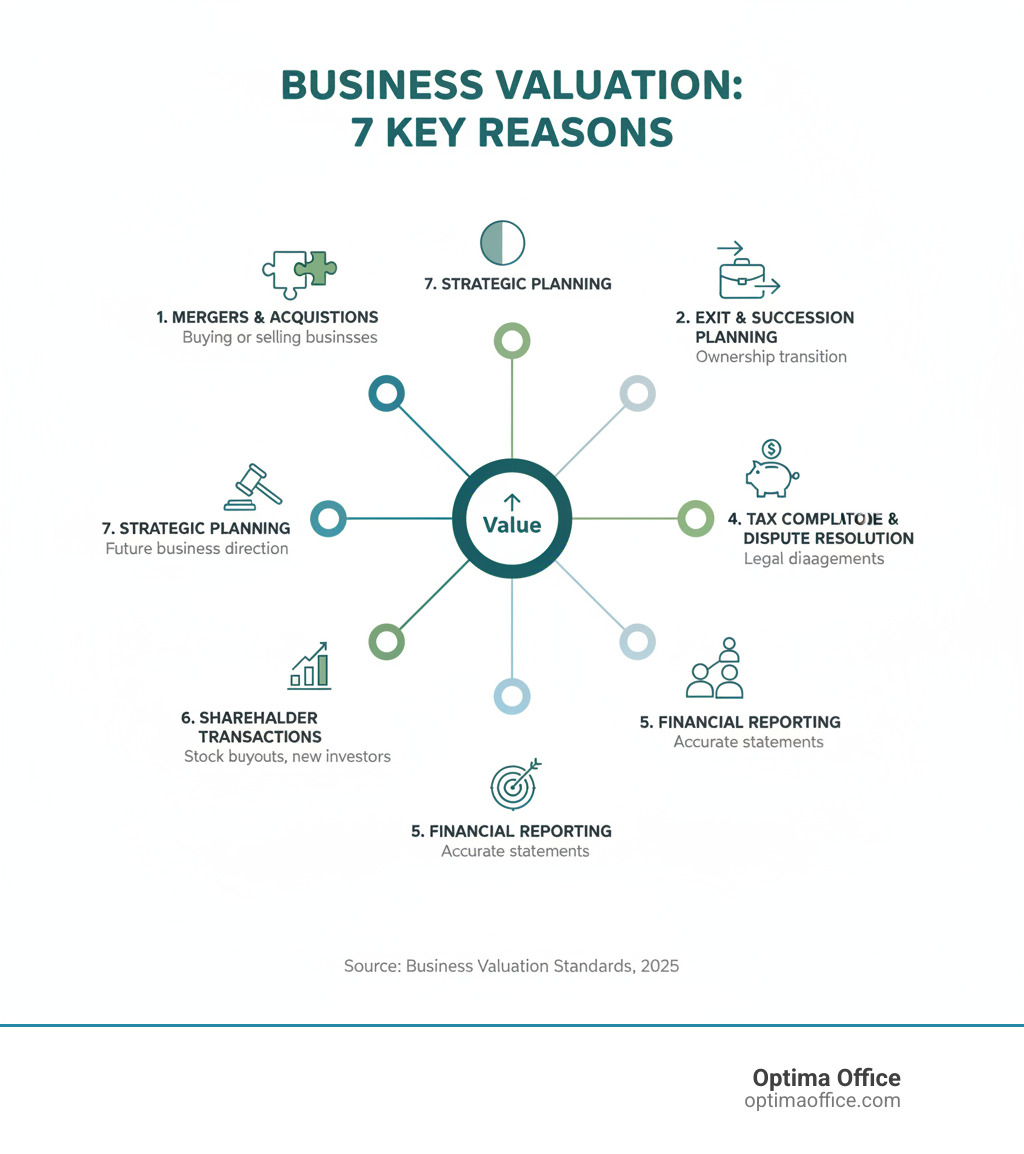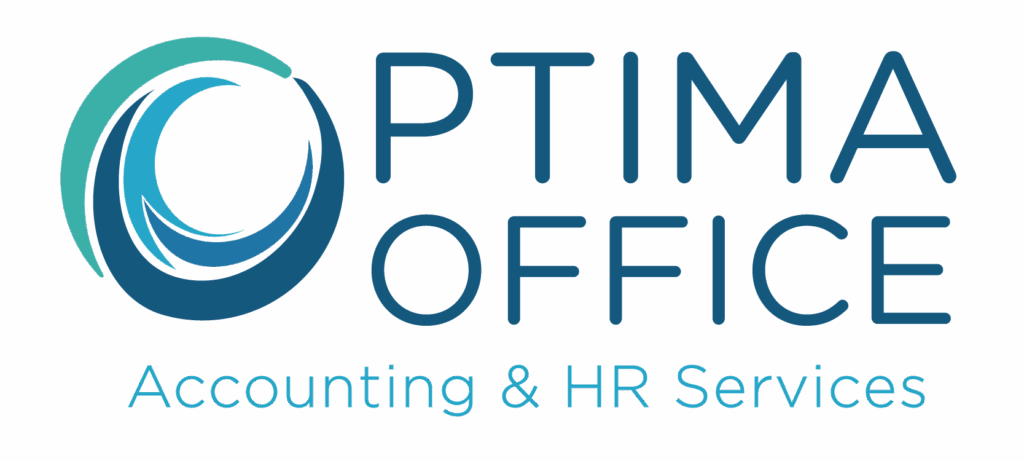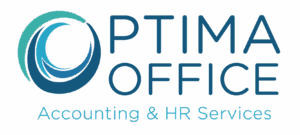Understanding Business Valuation Support: The Foundation of Smart Business Decisions
Business valuation support is the professional service that helps business owners determine the fair market value of their company through expert analysis, methodologies, and reporting. This service combines financial expertise with industry knowledge to provide accurate, defensible valuations for various business purposes.
Key Components of Business Valuation Support:
- Expert Analysis – Professional assessment using proven valuation methods
- Comprehensive Reporting – Detailed documentation ranging from 10-100+ pages
- Defensible Results – Valuations that withstand IRS, court, or auditor scrutiny
- Strategic Guidance – Professional judgment on value creation and business decisions
- Multiple Applications – Support for M&A, tax planning, litigation, exit planning, and more
Here’s a sobering reality: 98% of business owners don’t know the value of their business, yet 78% plan to fund their retirement through the sale of that same business. This disconnect creates enormous risk.
Your business represents your life’s work and likely your largest asset. Whether you’re considering a sale, planning your exit, facing a legal dispute, or simply want to understand your company’s worth, professional valuation support provides the objective analysis you need.
Business valuation is both an art and a science – combining analytical approaches with professional judgment gained from years of experience across industries and business situations. The “science” involves proven methodologies like income, market, and cost approaches. The “art” lies in applying these tools effectively while understanding how value is created in your specific industry and circumstances.
For small and mid-sized businesses, having accurate financial data and strong accounting systems is crucial before any valuation can begin. Without clean books and reliable financial reporting, even the best valuation expert can’t provide meaningful results.

The Cornerstone of Strategic Decisions: What is Business Valuation?
![IMAGE] of a magnifying glass over a financial document
Picture this: you’ve built a successful business from the ground up, pouring your heart, soul, and countless hours into making it thrive. But if someone asked you right now what it’s worth, could you give them a confident answer? Most business owners can’t—and that’s where business valuation support becomes invaluable.
Business valuation is the process of determining what your company is actually worth in today’s market. It’s not just about adding up your assets or looking at last year’s profits. It’s a comprehensive analysis that considers your financial performance, growth potential, industry position, and dozens of other factors that impact value.
Now, you might hear people use “business appraisal” and “business valuation” as if they mean the same thing, but there’s an important distinction. A business appraisal is often a quick, informal estimate—maybe something you’d use for internal planning or casual discussions. A professional business valuation, however, is a thorough, documented process that follows established standards and can stand up to scrutiny from the IRS, courts, or potential buyers.
Here’s a statistic that might surprise you: 78% of business owners plan to fund their retirement by selling their business. Yet most have no idea what their company is actually worth. That’s like planning to retire on your home’s value without ever getting it appraised—it’s a recipe for disappointment or missed opportunities.
Beyond retirement planning, knowing your business value is crucial for making smart strategic decisions. Should you invest in new equipment? Expand to a new location? Take on a partner? These decisions become much clearer when you understand your company’s current worth and growth potential.
A solid valuation also gives you a clear picture of your financial health. When your books are in order and your financial systems are strong, you can make these strategic moves with confidence. That’s why accounting and finance consulting services are so important—they create the foundation that makes meaningful valuation possible.
Key Inputs and Influencing Factors
Think of a business valuation like baking a cake—you need the right ingredients in the right proportions to get a good result. The quality of your “ingredients” directly impacts the accuracy and usefulness of your valuation.
Your financial statements are the starting point. These historical records show how your business has performed over time and help predict future success. But raw numbers only tell part of the story—we need to understand the quality and sustainability of your earnings.
Cash flow is absolutely critical because it shows your business’s ability to generate actual money, not just accounting profits. A company might look profitable on paper but struggle to pay bills if cash flow is poor. If you’re looking to improve this area, our cashflow tips can help you optimize your cash management.
Don’t overlook your intangible assets—these hidden gems can significantly boost your company’s value. Your customer relationships, brand reputation, proprietary processes, skilled employees, and even your company culture all contribute to worth. These assets often don’t show up on balance sheets but can be your most valuable competitive advantages.
The quality of your management team plays a huge role too. Investors and buyers want to know the business can thrive even if you step back. A strong leadership team with clear succession plans adds tremendous value, while a business that depends entirely on one person faces significant discounts.
Industry trends and economic conditions also matter enormously. Is your industry growing or declining? Are new technologies disrupting traditional business models? These external factors can dramatically impact your company’s future prospects and current value.
Finally, your company’s life cycle stage influences everything. A rapidly growing startup faces different valuation considerations than a mature, stable business or one in decline. Each stage has unique opportunities and challenges that affect value creation.
Critical Moments: When a Valuation is Essential
While it’s always smart to understand your business value, certain situations make professional business valuation support absolutely essential. These are the moments when having an accurate, defensible number can save you money, protect your interests, or open new opportunities.
Mergers and acquisitions top the list—whether you’re buying or selling, you need to know you’re getting a fair deal. Financial reporting requirements often mandate formal valuations, especially for purchase price allocations or testing asset impairment.
Tax planning situations, particularly estate and gift tax scenarios, require IRS-compliant valuations. Getting this wrong can be expensive, so professional expertise is crucial. Litigation and dispute resolution also demand objective valuations—whether you’re dealing with shareholder conflicts, divorce proceedings, or damage calculations.
Shareholder buyouts need fair pricing to prevent disputes and maintain relationships. Exit and succession planning requires knowing your company’s worth to set realistic goals and timelines. If you’re raising capital, investors want to see credible valuations before committing funds.
The common thread in all these situations? You need numbers that will hold up under scrutiny and serve your specific purpose. That’s where professional business valuation support becomes not just helpful, but essential for protecting your interests and making informed decisions.
The Art and Science of Determining Business Worth
When people ask us about business valuation support, we often tell them it’s like being both a detective and an artist. There’s the detective work – analyzing financial data, researching market trends, and applying proven methodologies. But there’s also the artistry – understanding the unique story of each business and knowing how to interpret what the numbers really mean.
The science gives us the foundation. We have established frameworks, mathematical models, and analytical tools that provide structure to our work. These methods have been tested across thousands of businesses and refined over decades of practice.
But here’s where it gets interesting: every business is different. Your company has its own culture, challenges, and opportunities that can’t be captured in a simple formula. This is where professional judgment becomes crucial. Our team brings years of experience across diverse industries, which helps us see patterns and understand nuances that might not be obvious from the financial statements alone.
We also know that different stakeholders have different expectations. What satisfies a bank for lending purposes might not hold up in court during litigation. Understanding these varying requirements is essential for creating a defensible valuation that serves its intended purpose.
The ‘Science’: Core Valuation Methodologies
The scientific foundation of valuation rests on three core approaches, each offering a different perspective on your company’s worth.
The Income Approach focuses on what your business can generate in the future. The most common method here is the Discounted Cash Flow (DCF) analysis. We project your company’s future cash flows and then discount them back to present value using an appropriate rate that reflects the risk of achieving those projections. Essentially, we’re answering: “What are the future earnings of this business worth today?”
The Market Approach works like comparing houses in a neighborhood. We look at what similar businesses have sold for recently, either through actual transactions or by studying publicly traded companies in your industry. We apply market multiples – such as a multiple of revenue or EBITDA – to determine what buyers are willing to pay for businesses like yours.
The Cost Approach takes a different angle entirely. It values your business by adding up the fair market value of all assets and subtracting liabilities. This approach works well for asset-heavy businesses or companies with limited operating history, though it’s less common for established operating businesses.
The key is knowing which approach – or combination of approaches – makes the most sense for your specific situation. This is where our expertise in helping business owners make strategic decisions becomes valuable. You can learn more about how we guide these important choices at 6 Ways Accountants Help Business Owners Make Smarter Business Decisions.
The ‘Art’: Professional Judgment and Value Creation
While methodologies provide the framework, the real value of professional business valuation support comes from understanding the story behind your numbers.
We spend considerable time analyzing how your business creates value. This isn’t just about current performance – it’s about understanding how you’ve built value in the past and how you’ll continue creating it in the future. We look at how effectively you deploy capital, whether your returns exceed your cost of capital, and what drives sustainable competitive advantages in your industry.
Professional judgment becomes critical in several areas. Forecasting future performance requires more than spreadsheet skills. We need to understand your market dynamics, competitive position, operational efficiency, and management’s strategic vision.
Applying discounts and premiums is another area where experience matters. We might apply a discount for lack of marketability if you’re valuing minority shares in a private company. Or we might add a premium if the ownership interest provides strategic control. These adjustments require careful analysis and solid justification.
Normalizing financial statements is often necessary because many businesses have owner-specific expenses or one-time events that distort true operating performance. We adjust these statements to reflect what a typical buyer would expect to see, providing a clearer picture of sustainable earnings.
We also interpret qualitative factors that don’t show up directly in financial statements. The strength of your brand, quality of customer relationships, depth of intellectual property, and effectiveness of operational processes all contribute to value. Our judgment helps weave these intangible elements into the final valuation.
This combination of analytical rigor and seasoned judgment ensures our valuations reflect both mathematical precision and real-world business complexities. It’s an essential part of understanding your company’s overall financial health, which you can explore further in Assessing Your Business Financial Health Going Into 2020.
The Strategic Advantage of Professional Business Valuation Support
When you’re facing a major business decision, you want to know you’re making the right choice. That’s exactly what professional business valuation support gives you—confidence backed by expertise. It’s not just about getting a number on a piece of paper; it’s about gaining a strategic advantage that can make or break your next move.
Think about it this way: you wouldn’t perform surgery on yourself or represent yourself in a complex legal case. The same principle applies to valuing your business. While online calculators and rough estimates might seem tempting, they simply can’t provide the depth, accuracy, and defensibility that professional services offer.
Here’s what sets professional valuation apart. Objectivity is perhaps the most valuable benefit. As a business owner, you’re emotionally invested in your company—it’s your baby, your life’s work. That emotional connection, while admirable, can cloud your judgment when it comes to value. Professional valuators bring fresh, unbiased eyes to your business, seeing it as potential buyers, investors, or courts would.
Credibility follows closely behind. When you’re dealing with the IRS, potential buyers, or legal proceedings, having a valuation prepared by qualified professionals following established standards carries weight. It’s the difference between saying “I think my business is worth X” and presenting a thoroughly researched, professionally prepared analysis that says “Based on comprehensive analysis using industry-standard methodologies, this business is worth X.”
The defensibility aspect cannot be overstated. Professional valuations are designed to withstand scrutiny from regulatory bodies, auditors, and courts. We don’t just give you a number—we provide a well-documented trail of reasoning, analysis, and justification that can stand up to challenges. This is crucial whether you’re facing an IRS audit, going through litigation, or negotiating a major transaction.
Finally, you gain access to specialized expertise that would be prohibitively expensive to maintain in-house. Our team brings years of experience across industries, advanced training, and knowledge of the latest valuation standards and market trends. For small and mid-sized businesses, this level of expertise is typically out of reach—until now. This is part of why Why Your Business Needs More Than Just a Bookkeeper rings so true; strategic financial guidance requires specialized knowledge.
Finding the Right Expert for Business Valuation Support
Not all valuation professionals are created equal. Just like you’d research a surgeon’s credentials before going under the knife, you need to ensure your valuation expert has the right qualifications and experience.
The gold standard credentials to look for include Certified Valuation Analyst (CVA) designation from the National Association of Certified Valuation Analysts (NACVA). This credential represents rigorous training specifically in business valuation methodologies and standards.
Accredited in Business Valuation (ABV) is another top-tier credential, awarded by the American Institute of Certified Public Accountants (AICPA) to CPAs who’ve demonstrated specialized expertise in business valuation. This combination of accounting knowledge and valuation expertise is particularly powerful.
A Certified Public Accountant (CPA) designation, while broader than valuation-specific credentials, provides essential foundation knowledge in accounting principles, financial reporting, and tax implications—all critical components of accurate valuations.
M&A specialists bring real-world transaction experience to the table. They understand not just the theory of valuation but how businesses actually trade hands in the marketplace. This practical perspective can be invaluable, especially for transaction-related valuations.
The best valuation teams often combine multiple credentials and specialties, bringing diverse perspectives to ensure every angle of your business is properly considered and valued.
How Expert Business Valuation Support Aids Litigation
Legal disputes involving business value can be some of the most complex and high-stakes situations you’ll ever face. Whether it’s a partnership dispute, divorce proceedings, or damage calculations, having expert business valuation support can literally make the difference between winning and losing.
Expert witness testimony is where our professionals really shine. We don’t just crunch numbers—we explain complex financial concepts in clear, understandable terms that judges and juries can grasp. Our credibility stems from thorough preparation, meticulous research, and the ability to present findings in a compelling, organized manner.
Damage calculations require a special blend of financial expertise and investigative skills. When someone claims they’ve been financially harmed by another party’s actions, we can quantify those losses, whether it’s lost profits from a breach of contract, economic damages from intellectual property theft, or unjust enrichment calculations.
Shareholder disputes often center on the question “What’s my share worth?” An independent, professional valuation can cut through the emotion and provide an objective foundation for buyouts or settlements, potentially saving all parties significant legal fees and stress.
In divorce proceedings, a business often represents the largest marital asset. Our valuations help ensure fair distribution while providing clarity during an emotionally charged time. The last thing anyone needs during a divorce is to fight over business value when professional analysis can provide definitive answers.
Breach of fiduciary duty cases require careful analysis of financial records and business operations to determine the financial impact of alleged misconduct. We can trace through complex transactions and operational changes to quantify the harm done.
Having clean, organized financial records is crucial for any litigation scenario. That’s why we emphasize the importance of proper financial infrastructure through our fractional controller and CFO services. Learn more about these critical roles in The Role of Bookkeepers, Controllers, and CFOs.
Understanding Valuation Reports: From Calculation to Comprehensive
One size definitely doesn’t fit all when it comes to valuation reports. The type of report you need depends entirely on how you’ll use it and the level of scrutiny it might face. Understanding these differences can save you both time and money while ensuring you get exactly what you need.
A Calculation Report is your streamlined option, typically running 10-20 pages. It’s perfect for negotiation purposes, internal planning, or when you need a preliminary estimate to guide decision-making. This report provides a “calculation of value” rather than a full “opinion of value,” making it ideal for situations where you need guidance but don’t require the highest level of defensibility.
Summary Reports step up the game with 20-30 pages of analysis. These are ideal for tax and legal purposes where you need an “opinion of value” but the users have some business knowledge. They work well for estate and gift tax filings, shareholder disputes, and many legal matters where professional judgment is required but extensive background isn’t necessary.
Full Reports are the comprehensive option, running 40-100+ pages or more. These are built for court defense and high-scrutiny situations where every detail matters. When facing potential legal challenges, complex transactions, or situations where users need extensive education about the business and industry, this is your go-to option.
The key distinction between reports lies in whether they provide an Opinion of Value versus a Calculation of Value. An opinion involves our professional judgment and higher assurance levels, while a calculation follows agreed-upon procedures with less definitive conclusions.
Getting the foundation right is crucial for any valuation report. Our Fractional Controller Services ensure your financial data is always organized, accurate, and ready for whatever level of analysis your situation demands.
Frequently Asked Questions about Business Valuation
We understand that considering a business valuation can feel overwhelming. After years of helping business owners through this process, we’ve heard just about every question imaginable. Let’s tackle the most common ones to help put your mind at ease.
How much does a business valuation cost?
This is usually the first question we hear, and honestly, it’s a smart one to ask upfront. The reality is that valuation costs vary quite a bit, and understanding what drives those differences can help you budget appropriately.
Traditional business valuations typically start around $8,000 and can go much higher depending on your specific situation. We know that might sound steep, but remember – you’re not just buying a number. You’re investing in a comprehensive analysis that could influence major life decisions or protect you in legal situations.
The type of report you need makes the biggest difference in cost. A basic Calculation Report for internal planning will cost significantly less than a Full Report designed to withstand IRS scrutiny or court challenges. Think of it like buying a car – you can get basic transportation or a luxury model with all the features, depending on your needs.
Your business complexity also plays a huge role. If you run a straightforward retail operation with clean books, that’s one thing. But if you have multiple revenue streams, complex ownership structures, or significant intangible assets, expect to invest more in the process. Specialized industries that require extra research and expertise will also impact the price.
The good news? There are now software-based solutions and streamlined processes that can deliver quality valuations for much less than traditional methods, especially for standard business situations. We’re always transparent about pricing and work with you to find the right balance of thoroughness and cost-effectiveness.
How long does the valuation process take?
Time is money, as they say, and we get that you don’t want this process dragging on forever. Most traditional valuations take four to six weeks from start to finish, but we’ve streamlined our process to deliver many standard valuations in 3-10 business days.
Here’s what really determines the timeline: you and your data. The biggest factor is how quickly you can gather and provide complete, accurate financial information. If your books are well-organized and your financial statements are current, we can move fast. But if we’re waiting for missing documents or trying to make sense of incomplete records, things slow down considerably.
The complexity of your business matters too. A simple service business with straightforward operations moves through our process much faster than a manufacturing company with multiple locations and complex inventory. High-stakes situations like litigation or IRS disputes require extra documentation and review time, which extends the timeline.
Your responsiveness during the process makes a huge difference. When we reach out with follow-up questions or requests for clarification, quick responses keep everything on track. We’ve seen valuations that could have taken two weeks stretch to two months simply because of communication delays.
The best part about working with us? We handle much of the heavy lifting. Our team knows exactly what information we need and how to organize it efficiently, so you’re not left guessing about next steps.
What are the common challenges in business valuation?
Let’s be honest – if business valuation support were simple, every business owner would do it themselves with a calculator. The reality is that valuation involves both art and science, and that creates some inherent challenges.
Subjectivity is probably the biggest hurdle. Despite all our sophisticated methodologies, we’re still making educated assumptions about the future. How will your industry evolve? What will interest rates do? How will new competitors affect your market share? These judgments require experience and careful analysis, which is why professional expertise matters so much.
Finding comparable data for private companies can be tricky. Public companies have transparent financial information and clear market values, but private businesses operate more quietly. When we’re looking for similar companies that have recently sold, we sometimes have to get creative with our research and analysis.
Forecasting future performance never gets easier, no matter how many years we’ve been doing this. Economic shifts happen. Industries get disrupted. Global events (hello, 2020!) can turn projections upside down overnight. This is where our experience across different economic cycles and industries really helps.
Normalizing financial statements often surprises business owners. Your books might show certain expenses or one-time events that don’t reflect normal operations. Maybe you’ve been running personal expenses through the business, or you had unusual legal fees last year. We need to adjust for these items to show what a typical buyer would expect to see.
Intangible assets present their own puzzle. How much is your brand worth? What about your customer relationships or that proprietary process you’ve developed? These assets can be incredibly valuable, but putting a precise number on them requires careful analysis and industry knowledge.
Despite these challenges, this is exactly why professional business valuation support exists. We’ve steerd these complexities thousands of times, and we know how to work through them systematically. It’s also why having solid financial systems and accurate books is so crucial – the better your underlying data, the smoother the whole process goes. If you’re dealing with financial gaps or inconsistencies in your records, our Financial Gap Diagnosis can help identify and resolve these issues before you need a valuation.
Conclusion
Here’s the truth that keeps us up at night: 98% of business owners don’t know the value of their business, yet many are counting on selling that same business to fund their golden years. That’s like planning a cross-country road trip without knowing how much gas is in your tank.
Business valuation support isn’t just about getting a fancy report with a dollar figure on it. It’s about understanding what makes your business tick, where its real strengths lie, and what might be holding it back. Think of it as a comprehensive health check-up for your company – one that reveals not just where you stand today, but where you could be tomorrow.
When you’re facing major decisions – whether that’s selling to a competitor, bringing in a new partner, planning your exit strategy, or even just trying to sleep better at night knowing what you’ve built – having that professional, objective assessment becomes your North Star. It’s the difference between making educated decisions and taking expensive shots in the dark.
The real value of working with valuation experts goes beyond the math. Yes, we bring the technical expertise and follow all those professional standards that keep the IRS happy. But more importantly, we bring clarity to what can feel like an overwhelming process. We translate complex financial concepts into plain English and help you see your business through fresh eyes.
At Optima Office, we’ve learned that the best valuations start with rock-solid financial foundations. You can’t build a reliable valuation on shaky books or incomplete records. That’s why we’re passionate about providing the foundational financial clarity and high-level expertise through our Fractional CFO Services and Controller Services to ensure your valuation is built on accurate and insightful data.
Whether you’re just curious about your company’s worth or preparing for a major transaction, remember this: knowledge is power, and in business, that power translates directly to better outcomes. We’re here to help you open up your business’s true potential and guide you toward maximizing profits, minimizing risk, and driving the kind of growth that makes all those late nights and tough decisions worthwhile.






